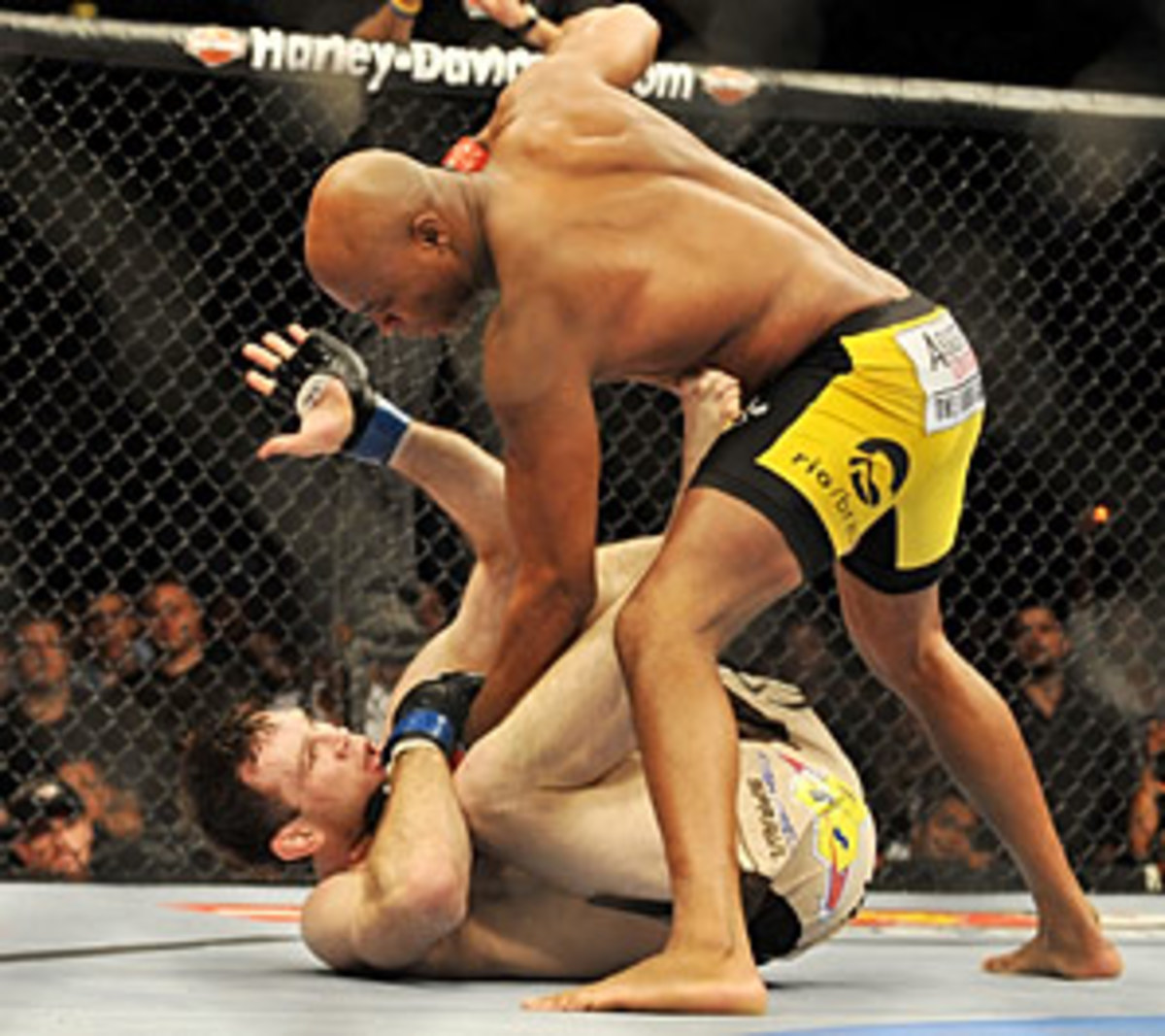Anderson Silva wants heavyweight paydays, more notes
Prior to Silva's flooring Forrest Griffin earlier this month in Philadelphia, SI.com confirmed that Silva's representatives had spoken with Zuffa about the heralded UFC middleweight champion moving up to heavyweight for the first time in his career.
Not only that, they already had an opponent in mind: Frank Mir.
Disinterested by middleweight contenders Nathan Marquardt, Demian Maia and Dan Henderson, and unwilling to fight close friend Lyoto Machida at light heavyweight -- where Silva could conceivably knock off challengers and make a disaster out of the UFC's marquee division -- "The Spider" needs new, challenging scenarios to stay motivated. A move to heavyweight would certainly achieve that, and according to Silva's manager Ed Soares, the UFC was receptive to the idea.
Based on longevity and dominance, the label of MMA's best fighter has arguably belonged to Russian heavyweight Fedor Emelianenko for the past few years. However, the gap between Emelianenko and Silva has closed to a photo finish. And if the UFC can be convinced that a move to heavyweight is the right plan as 185 sorts itself out, Silva could set himself up to supplant Emelianenko as the sport's best.
It would indeed be impressive for a former world champion at 167 pounds to climb all the way to heavyweight, where blockbusters against Mirko "Cro Cop" Filipovic, or, dare we say it, Brock Lesnar, a fight Silva would accept if the money is right, could materialize.
Beyond legacy issues, which media and fans tend to focus on more than fighters, the move up could drastically improve Silva's paydays, which would increase with the size of his opponents and corresponding pay-per-view numbers.
For all those reasons, I like the move.
Sure, the organization's middleweight division features several threats. But outside of Maia, we've already seen Silva brush most challengers aside. Silva's team argues that Henderson, Marquardt and Maia aren't deserving. They want the Marquardt-Maia winner to fight Henderson to establish a true contender in the division. I don't think it's a terrible idea. There shouldn't be any disagreement that Marquardt or Maia against Henderson would be a perfect bout to use the Nevada option of five-round non-title fights (more on that to come).
Otherwise, the one challenger rarely mentioned these days is Yushin Okami, whom Silva should fight before he leaves the division for good. Outside of that, you're talking about Vitor Belfort and Wanderlei Silva, both great names and potential draws who are just emerging at 185.
The best bouts might come at light heavyweight -- Silva vs. Rampage; Rashad; Shogun; and down the road, Jon Jones or Gegard Mousasi -- but with Silva and Machida refusing to fight, an extended stay at 205 doesn't make sense. By the sound of things, the talented Brazilians won't compete no matter how much pressure comes down from Dana White and the UFC.
"I'm gonna say there's no way they fight," said Soares, who also manages Machida.
What does that leave? Heavyweight.
Who wouldn't want to see whether Silva at his walk-around 215 to 220 pounds is good enough to defeat opponents regardless of weight? Pound for pound personified, I say. A win or two in the division would embolden fans and media with enough hope that Silva could be the one to stop Lesnar.
The pound-for-pound king an underdog? Imagine that.
(Special thanks to e-mailer Jared for the tip.)
As a close observer of state regulators since I began covering MMA more than nine years ago, I've always been impressed by the speed with which Nevada could enact rules changes. Perhaps that had more to do the approach of my home state of California, which works a bit like a tortoise negotiating a minefield, but still, Nevada deserves credit for following through on several changes to its regulations on Wednesday.
I've long been an advocate for five-round non-title main events, especially when championship caliber fighters were in the mix. Actually, I've proposed pushing title fights to seven rounds, but that debate has lost steam over the years. Twenty five minutes should be enough time to resolve a fight. Fifteen minutes? Not really. We're talking clashes between Chuck Liddell and Wanderlei Silva, Quinton Jackson and Keith Jardine. Even something like Carlos Condit vs. Martin Kampmann would qualify in my book.
Now, promoters in Nevada can push a non-title headliner to five rounds, providing world class fighters a real opportunity to finish bouts instead of the inevitable race to a decision. Let's hope other regulators follow suit.
I'm less excited about the prospect of instant replay to check on the validity of an outcome. Depending on how it's used, of course, it can be a great tool. But not all events will be broadcast. What about those? Either way, it'll be a neat experiment.
And finally, the commission took steps towards addressing the GSP-Penn "Greasegate" controversy that followed the pair's January fight. Language now exists that makes the use of foreign substances on the body that "could result in an unfair advantage" illegal. Hard to believe it wasn't before.
Georges St. Pierre, of course, was never reprimanded for doing anything wrong during a fight he dominated. But the specter of shadiness was reason enough to clarify the rule.
Kudos to Keith Kizer and the NSAC.
I've had the good fortune of appearing on HDNet's "Inside MMA" more than a handful of times. This Wednesday, the weekly mixed martial arts news program taped its 100th episode, a special retrospective featuring Kenny Rice, Bas Rutten and Ron Kruk looking back on some of the show's greatest guests (of which I'm sure I made the cut), and moments. Catch it if you can. As always, the show airs on Friday.





